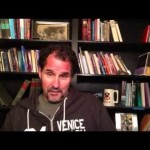We run our website the way we wished the whole internet worked: we provide high quality original content with no ads. We are funded solely by your direct support. Please consider supporting this project.
How do you respond to John 13:18–19; 17:12?
“I am not speaking of you all; I know whom I have chosen. But it is to fulfill the scripture, ‘The one who ate my bread has lifted his heel against me.’ I tell you this now, before it occurs, so that when it does occur, you may believe that I am he.’” Jesus prays to the Father, “I guard them [my disciples] and not one of them was lost except the one destined to be lost, so that the scripture might be fulfilled.”
This verse reveals that by the time Jesus made this statement Judas was “destined to be lost.” But neither this nor any other verse states when Judas became “destined” to be lost. I see no reason to think it was prior to the time when Judas, of his own free volition, irrevocably resolved it in his heart to turn against God. Scripture teaches us that there is a point when God sees that it is useless to strive with people any longer. He thus withdraws his Spirit from these people, hardens their heart, and determines their destiny (e.g. Gen. 6:3; Rom. 1:24–27). When this occurs the only remaining question is how God can strategically use the wickedness of these people to further his divine plans.
By virtue of his own wickedness Judas had apparently put himself in this position. The fact that Judas’ betrayal fulfilled scripture does not mean that he was the one who had to fulfill scripture.
In fact, it doesn’t seen that anyone had to betray Jesus to “fulfill” Scripture. The passage that Judas “fulfills” is Psalm 41:9, in which David complains that a “close friend” who “shared my bread” has “lifted up his heel against me.” There is clearly nothing predictive about this passage. If no one had betrayed Jesus, no one would be sitting around wondering why Psalm 41:9 wasn’t “fulfilled.” Consider that in the previous sentence David complained that people were saying he was going to die from a “vile disease” (41:8). People never said this about Jesus, yet no one worries that Psalm 41:8 wasn’t “fulfilled.”
When Jesus (or a Gospel author) says that an event “fulfills” an Old Testament passage, they don’t necessarily mean that the event was predicted by the Old Testament and that the event had to occur. What they often mean is simply that the event illustrates in a superlative way a principle found in the Old Testament passage. The event didn’t have to occur, but once it occurs, or once it becomes certain to occur, it takes on retroactive significance by being interpreted through the lens of an Old Testament passage. Judas’ betrayal of Jesus thus “fulfills” Psalm 41:9 in the sense that it is the supreme illustration of a betrayal of God’s servant. As a friend betrayed David, so Judas betrayed the Son of David.
This use of the term “fulfilled” may sound odd to modern western people, but it would not have sounded odd to first century Jews. It was a form of Bible interpretation called “midrash” that helped Jews interpret current events in light of Scripture.
Category: Q&A
Tags: Open Theism, Q&A
Topics: Open Theism, Responding to Objections
Verse: John 13, John 17
Related Reading

The Open View and Predestination
Paul wrote in Ephesians, “For he [God] chose us in him before the creation of the world to be holy and blameless in his sight. In love he predestined us for adoption to sonship through Jesus Christ …” (Eph 1:3-4). Some argue that the particular way Scripture portrays God’s providential plan is incompatible with the…

Video Q&A: Do you think Jehovah’s Witnesses and Mormons are saved?
Does Greg believe that everyone goes to Heaven regardless of their beliefs? Find out here.

Should churches have armed security guards?
Question: Recently (December, 2007) a security guard at New Life Church in Colorado Springs shot and apparently killed a man who was shooting people in the church parking lot. The pastor (Brady Boyd) hailed her as a “real hero.” Do you think churches should have armed security guards and do you think the pastor was…

What is the right way to interpret Revelation?
Few biblical topics have captured the imagination of contemporary evangelicals like the book of Revelation. The recent unprecedented success of the Left Behind series is evidence of this popular fascination. Many evangelicals don’t realize that the futuristic interpretation of Revelation advocated in this popular series is only one of several interpretations evangelicals espouse. Here’s the…

How do you respond to Acts 17:26?
“From one ancestor he made all nations to inhabit the whole earth, and he allotted the times of their existence and the boundaries of the places where they would live.” (cf. Dan. 2:21) In this passage Paul is preaching to Epicurean and Stoic philosophers (17:18). His goal is to show them that, in contrast to…

When God’s “Plan A” Falls Through, What’s Next?
Image by Katie Tegtmeyer via Flickr Suzanne was angry, to say the least. Since her early teens, her only aspirations in life were to be a missionary to Taiwan and to marry a godly man with a similar vision, and she prayed daily about these. She went to a Christian college and, quite miraculously, quickly met…
